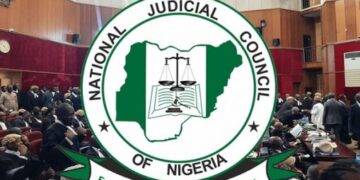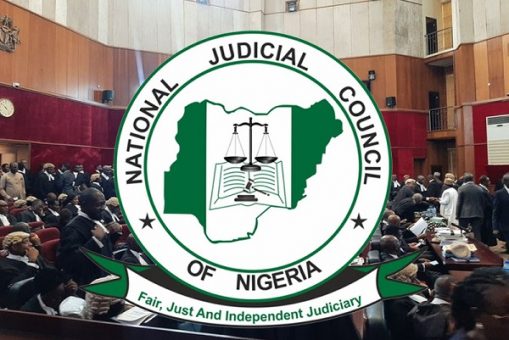The National Judicial Council, under the chairmanship of the Chief Justice of Nigeria, Justice Kudirat Kekere-Ekun, has approved the compulsory retirement of no less than 11 judges.
The council arrived at the resolution at its 109th meeting held on June 25, 2025 and presided over by the CJN.
A statement signed by the NJC Deputy Director of Information, Kemi Ogedengbe, on Thursday in Abuja, disclosed that among the 11 judges recommended for compulsory retirement, 10 of the judges are from the Imo State Judiciary.
“Nine of the affected judges of the Imo State Judiciary were found to have altered their dates of birth in their official records in order to confer on themselves the undue advantage of staying longer in service,” the statement noted.
The nine judges found to have falsified their records, comprising five High Court judges and four judges of the Customary Court of Appeal in Imo State.
They include: Justice M. E. Nwagboso (High Court), Justice B. C. Iheka (High Court), Justice K. A. Leaweanya (High Court), Justice Okereke Chinyere Ngozi (High Court), Justice Innocent Chidi Ibeawuchi (High Court), Justice Tennyson Nze (Customary Court of Appeal), Justice Ofoha Uchenna (Customary Court of Appeal), Justice Everyman Eleanya (Customary Court of Appeal), Justice Rosemond Ibe (Customary Court of Appeal).
Also, Justice Babatunde Bakre of the Ogun State High Court and Justice H. O. Ajayi of the Kwara State High Court were also recommended for retirement.
The statement added that Justice T. N. Nzeukwu was found to have made himself available to be sworn in as acting Chief Judge of Imo State High Court, knowing fully well that he was number four in the hierarchy of judges of the Imo State Judiciary, and contrary to Section 271 (4) of the Constitution.
This earned him a sanction while the President of the Customary Court of Appeal, Imo State, Justice V. U. Okorie, who chaired the commission that nominated Justice Nzeukwu as acting Chief Judge, was absolved, having dissented on record against the recommendation to appoint Justice Nzeukwu as acting Chief Judge.
The council added that it took the decision after consideration of the reports of its Investigation Committee on allegations of age falsification against 18 judges of the Imo state judiciary on the one hand.
The council reiterated its earlier directive to the Imo State Governor, Senator Hope Uzodinma, to swear in the most senior judge of the state as the acting Chief Judge.
The council, however, dismissed, for want of merit, age falsification allegations brought against three judges of the State High Court whose dates of birth were found to bear no discrepancy.
Six High Court judges of the state, whose dates of birth either had discrepancies but with acceptable explanations or with discrepancies arising from genuine correction of their dates of birth to their disadvantage, were also exonerated.
The judges whose dates of birth were found to bear no discrepancy are: Justice I. O. Agugua, Justice C. A. Ononeze-Madu and Justice L. C. Azuama.
The two judges who were given a clean bill of health owing to the provision of an acceptable explanation for discrepancies in their dates of birth are Justice Vincent I. Onyeka and Justice Vivian O. B. Ekezie.
The council, however, directed that both justices must maintain the date of birth supplied by the Council of Legal Education in their official records.
Four other judges were absolved on account that they genuinely corrected their dates of birth to their disadvantage, including: Justice P. U. Nnodum, Justice Alma Ngozi Eluwa, Justice Matthew Chinedu Ijezie and Justice Ononogbo Linus.
The council, in further deliberation, barred a judge of the National Industrial Court, Justice Isaac Essien, from being considered for promotion to a higher court for three years due to misconduct.
Council found that Justice Essien wrongly ordered the confiscation of over N1 billion belonging to the Nasarawa State Government and its Local Government Councils, despite being aware that there was a pending appeal and a pending application for stay of execution.
Council also noted that he refused to step aside from the case after the Nasarawa State Government raised concerns about possible bias.
“Justice Essien was a former staff member of the state university, which owed him gratuity, and he had earlier demanded payment using the official letterhead of the court — a clear breach of Code of Conduct for Judicial Officers,” the statement added.
The NJC also criticised Justice Essien for personally visiting the Court of Appeal registry to confirm if an appeal had been filed in the case — an action considered highly inappropriate for a judge.
The council found Justice Essien guilty of violating several rules in the Revised Code of Conduct for Judicial Officers and reprimanded, barred him from elevation to a higher judicial office for a period of three years.
The NJC also considered the reports of its Preliminary Complaints Assessment Committees, which contained a total number of 30 petitions against various Judicial Officers.
Four committees were empanelled for further investigation, four judges were cautioned, while 22 petitions were dismissed for lacking merit.
The council cautioned Justice Rahman Oshodi over the misuse of judicial discretion in Suit No. ID/232/53C/23.
Justice Daniel Okungbowa, Chief Judge of Edo State, was also cautioned over abuse of his judicial discretion in Suit No. B1/555/2020 and was advised to exercise his discretion judicially and judiciously in future.
The council issued a final warning to Justice G. B. Okolosi of the Delta State High Court for continued flouting Section 294 (1) of the 1999 Constitution, and Justice Sa’adatu Mark, of the Federal High Court, received a caution for delivering judgment after the constitutional 90 days.
On the petition against the Chief Judge, Benue State, Justice M. A. Ikpambese, the council deliberated on the report of the investigation Committee in respect of three petitions by Attorney-General and Commissioner for Justice, Fidelis Bemsen Mnyim, Guana Benjamin Joseph, and Terhemen Ngbea against Justice Ikpambese and absolved the Chief Judge from any judicial wrongdoings, the petitions having been found to be lacking in merit.
It noted that all the petitions presented against him were with the sole aim of removing him from his position.
Council was particularly concerned about the role of the Attorney-General of the State, Fidelis Mnyim, in the scheme to remove the Chief Judge and resolved to report him to the Legal Practitioners’ Disciplinary Committee for necessary action.
The council also dismissed petitions against four other judges: Justice A. M. Liman of the Federal High Court, Kano Division who was Petitioned by Abdullahi Bichi, Justice S. A. Amobeda who was petitioned by Abdullahi Bichi, Justice Muhammad Auwal Haruna, who was Petitioned by Abdulrazaq Abubakar, Justice Binta Fatima Murtala Nyako who was petitioned by Kabiru S. Chafe.
The joint petition against Justice Liman and S. A. Amobeda, and the petition against Justice Haruna were withdrawn and accordingly dismissed.
Justice Murtala Nyako was exonerated as the council found no merit in the petition accusing her of delaying judgment and issuing an order on a property while the case was ongoing.
Further action was suspended in respect of petitions against Justice A. M. Liman by Kenneth Okere (in a different case) and Justice Yusuf Halilu of the FCT High Court for being sub judice.
PUNCH









































